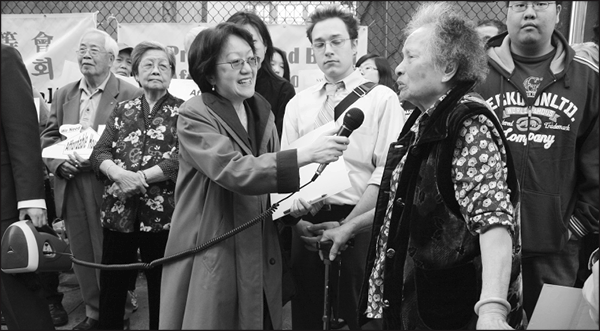By Julie Shapiro
When it comes to affordable housing, any victory is better than no victory — but a group of Baxter St. tenants aren’t celebrating just yet.
The tenants, who live in 12 rent-stabilized apartments at 126-128 Baxter St. in Chinatown, found out last year that their landlord was trying to evict them and demolish the buildings. Earlier this month, the state Division of Housing and Community Renewal sided with the tenants and ordered the landlord to renew their two-year leases.
But while the win is a relief, it isn’t a permanent fix. Edison Properties, which owns the Baxter St. buildings, lost on a technicality and can appeal the ruling.
To rally support for what they see as an ongoing battle, 40 people gathered in front of the two endangered buildings last Thursday.
Led by Margaret Chin, deputy executive director of Asian Americans for Equality, they took turns at the microphone, speaking in Chinese and English. Behind the speakers, tenants and tenant advocates waved signs reading “Save the Baxter St. Buildings” and “Preserve Affordable Housing in Chinatown.”
Yewchung Lee, 78, has lived on Baxter St. for 18 years. With white hair and wire-rimmed glasses, Lee said through an interpreter that he does not want to leave the apartment where his grandchildren were born. Lee doesn’t speak much English, and he said living in Chinatown allows him to go grocery shopping and attend doctor’s appointments.
“If I move too far away, I could starve to death,” Lee joked in Chinese.
John Gorman, the lawyer representing the tenants, cautioned the crowd that the win is a temporary fix. The D.H.C.R. denied the eviction application because Edison Properties was late in submitting a zoning document — which doesn’t necessarily mean that the agency will preserve the building in the future. Edison can appeal the ruling until mid-May or reapply to demolish the buildings.
Edison Properties bought 126-128 Baxter St. early in 2005 and last year filed an application to evict the tenants and demolish the two adjacent five-story buildings. Edison owns a parking lot adjacent to the buildings, and tenants speculated that Edison wanted to temporarily use the site as a parking lot and then build luxury condos when the market improved.
An Edison spokesperson declined to comment.
The oldest tenant at the rally was Liu He Vun, 89. She moved to Baxter St. so long ago that she doesn’t remember how long she’s lived there, but said through an interpreter that it is the only place she has lived in the United States.
Wearing a flowered shirt and velvet vest, Liu shuffled up to the microphone during the rally and addressed the crowd in Chinese. Her grandchildren grew up on Baxter St., many in her apartment, she said.
Afterwards, Liu sat in front of the building and described how her apartment was a center for her whole extended family. Her great-grandson, Jeffery Liao, 19, translated.
Liu’s apartment was the first stop when family members arrived from China, she said. Nephews and grandchildren crowded into her four-room apartment, lined with bunk beds.
Liu feels at home on Baxter St. and in Chinatown and can’t imagine going anywhere else. Her husband died several months ago and family members hired a maid to help take care of her.
“This is not a very mobile community,” said Aiyi Liao, 35, Liu’s granddaughter.
Aiyi Liao spent most of her childhood living in her grandmother’s apartment and is disturbed by the trend toward luxury development in Chinatown. Her grandmother is a rent-stabilized tenant paying between $500 and $600 a month, Liao said.
“It’s ridiculous — the rents in Manhattan,” Liao added. “How do you expect people to move to another place? It’s impossible.”
Another tenant, a woman with graying hair who was at first hesitant to approach the microphone, told the crowd that the landlord would harass her by banging on her door. Waving her fist to demonstrate, she said in Chinese that she doesn’t speak English well but tried to talk to the landlord. He offered her $20,000 if she moved out.
“Where will I move for $20,000?” she asked. “This is my home.”
Landlords are required to compensate rent-stabilized tenants, but the compensation is not enough, Gorman said. A tenant paying $500 a month for a three-bedroom apartment, for example, would receive about $35,500. The stipend can’t compete with rapidly rising rents in Chinatown and throughout the city, Gorman said.
Chin said the long-term solution is for the State Legislature to make it harder for landlords to evict tenants from rent-stabilized buildings. Landlords should have to submit plans for how they will replace the affordable housing they demolish, she said. Chin also wants landlords to help the displaced tenants find affordable apartments in their current neighborhood.
Housing advocates have protested other eviction-demolition plans on the grounds that the change amounted to a renovation, but in this case tenants believe Edison plans an actual demolition of the buildings.
Landlords who want to demolish buildings currently just have to show that their plans are lawful and they have money for construction, Gorman said. Edison received a $37 million loan for the Baxter St. project, he said.
On the other side of Baxter St., a new luxury condo building takes up half the block, and speakers frequently pointed to it as an example of what they do not want to see.
Chin is excited that the tenants are speaking out against Edison Properties and said it’s gratifying to see the results, at least so far.
“The initial victory is very good,” she said. “By standing together, when you organize, when you fight back, there is a chance.”
Julie@DowntownExpress.com

































